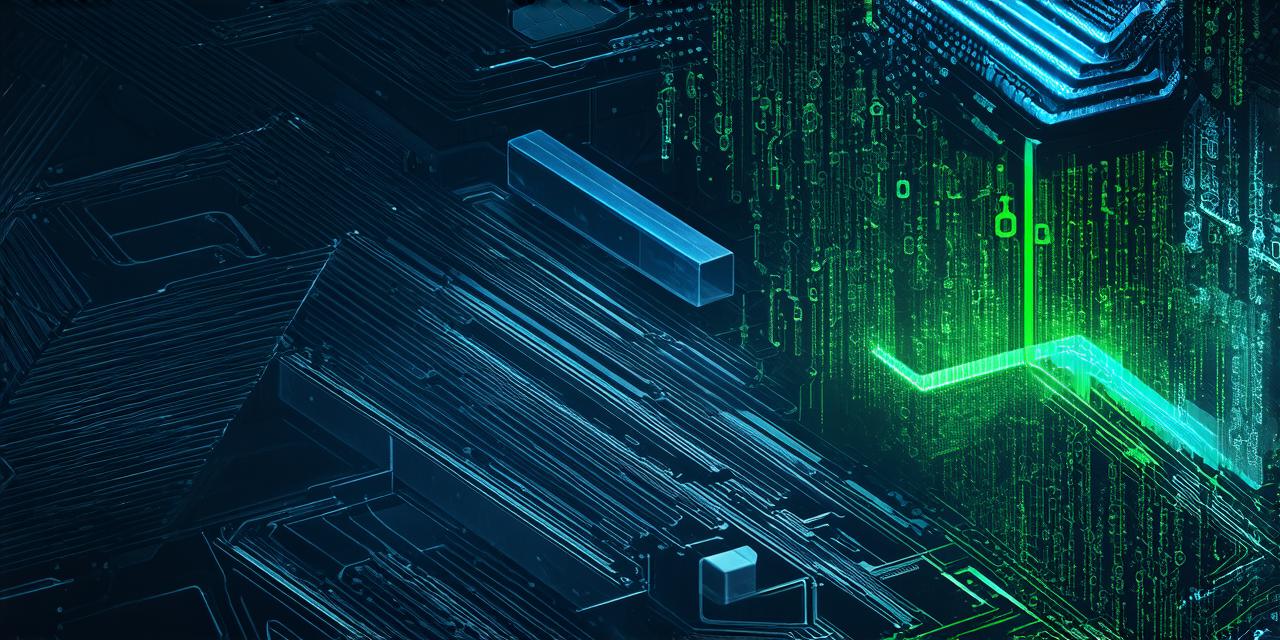Blockchain technology is transforming the way we think about data storage and security. It’s decentralized, transparent, and secure, making it ideal for various industries like finance, healthcare, and supply chain management. But what exactly does a block mean in blockchain? In this article, we will explore the concept of blocks and their significance in the world of blockchain technology.
What is a Block in Blockchain Technology?
In simple terms, a block is a collection of transactions that are grouped together based on specific criteria like time or user activity. Each block contains a unique identifier called a hash code, which ensures that no two blocks can be the same. The hash code is generated by a complex mathematical algorithm that takes into account the data in each block and other factors such as the previous block’s hash code.
The purpose of blocks in blockchain technology is to maintain a record of all transactions that take place on the network. This ensures that every transaction is transparent, immutable, and secure. Each block is linked to the previous block using its hash code, creating a chain of blocks that cannot be tampered with or altered.
Types of Blocks in Blockchain Technology
There are several types of blocks in blockchain technology, including:
-
Mining Blocks – These are the most common type of blocks in blockchain technology. They contain a list of transactions that have been verified by miners on the network. Miners compete with each other to solve complex mathematical problems and add new mining blocks to the chain. The first miner to solve the problem is rewarded with cryptocurrency.
-
Merge Blocks – These are used in merge mining, where two different blockchains are combined into a single chain. Merge blocks contain transactions from both blockchains and are added to the new merged chain.
-
Snapshot Blocks – These are used in situations where a snapshot of the current state of the blockchain is required. They contain all the data in the blockchain at a specific point in time and can be used for various purposes such as auditing or analysis.
-
Refund Blocks – These are used to refund transactions that have been mistakenly confirmed on the blockchain. The funds are transferred back to the original sender’s wallet, and a new transaction is added to the blockchain to reflect this.
The Importance of Blocks in Blockchain Technology
The importance of blocks in blockchain technology cannot be overstated. They ensure that all transactions on the network are secure, transparent, and immutable. Each block contains a unique identifier called a hash code, which ensures that no two blocks can be the same. This creates an unalterable chain of blocks that cannot be tampered with or altered, making it ideal for various industries like finance, healthcare, and supply chain management.
One of the most significant benefits of blocks in blockchain technology is their ability to maintain a decentralized system. There is no central authority controlling the network, which means that there is no single point of failure. This makes the network more resilient and secure against attacks or hacking attempts.
Another benefit of blocks in blockchain technology is their ability to enable transparency and accountability. All transactions on the network are visible to everyone, making it easy to track and verify them. This helps prevent fraud and corruption and ensures that all parties involved in a transaction are acting in good faith.
Case Studies: Real-life Examples of Blocks in Action
Let’s look at some real-life examples of blocks in action:
-
Bitcoin – The most well-known cryptocurrency in the world, Bitcoin uses blocks to maintain a record of all transactions that take place on the network. Each block contains a list of transactions and is verified by miners on the network. Once a block is verified, it is added to the chain, creating an unalterable record of all Bitcoin transactions.
-
Ethereum – Another popular cryptocurrency, Ethereum uses blocks to enable smart contracts. Smart contracts are self-executing contracts that can be programmed to automatically execute when certain conditions are met. This enables a wide range of applications on the Ethereum network, including decentralized finance and supply chain management.
-
Hyperledger Fabric – A blockchain platform designed for enterprise use, Hyperledger Fabric uses blocks to maintain a record of all transactions that take place on the network. Each block contains a list of transactions and is verified by nodes on the network. Once a block is verified, it is added to the chain, creating an unalterable record of all transactions on the network.

FAQs: Common Questions About Blocks in Blockchain Technology
1. How long does it take for a new block to be added to the blockchain?
The time it takes to add a new block to the blockchain depends on several factors, including the number of transactions in the block and the computational power of the miners on the network. In general, it takes about 10 minutes for a new block to be added to the Bitcoin blockchain.
2. How are blocks verified on the blockchain?
Blocks on the blockchain are verified using a complex mathematical algorithm called Proof of Work (PoW). The algorithm requires miners to solve a complex puzzle that involves verifying all the transactions in the block and adding them to the chain. Once a miner solves the puzzle, they are rewarded with cryptocurrency and their block is added to the chain.
3. Can blocks on the blockchain be deleted or altered?
No, once a block has been added to the blockchain, it cannot be deleted or altered. This creates an unalterable record of all transactions that take place on the network, ensuring transparency and accountability.
Conclusion: The Importance of Blocks in Blockchain Technology
In conclusion, blocks are a critical component of blockchain technology. They ensure that all transactions on the network are secure, transparent, and immutable, making it ideal for various industries like finance, healthcare, and supply chain management. Each block contains a unique identifier called a hash code, which ensures that no two blocks can be the same. This creates an unalterable chain of blocks that cannot be tampered with or altered, making it difficult to attack or hack the network.
